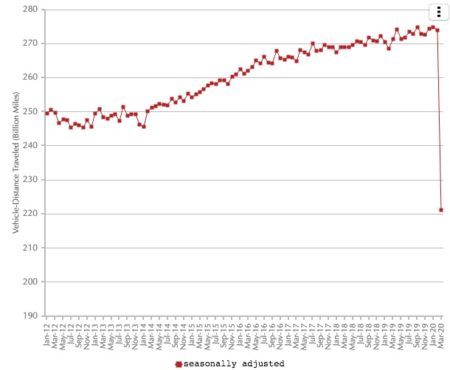What was unbalanced before can’t be restored to the previous exponential growth state.

Seasonally adjusted miles traveled by month. Seasonally adjusted data are modeled by the Bureau of Transportation Statistics, Office of the Assistant Secretary for Research and Technology, U.S. Department of Transportation. For additional seasonally adjusted travel data and information, go here:
http://www.transtats.bts.gov/OSEA/SeasonalAdjustment/
The whole global system of finance capital is so loaded down with unrepayable fiat currency debt that it has become like a bubble, like a fragile network of global supply chains. The system is now so burdened by interest due on the debt that a strong external shock like the pandemic can initiate an interactive global economic collapse.
The central banks like the Fed try to keep their economies pumped up with easy credit to maintain a population of consumers happy to keep spending themselves into debt, together with the consumerist spending inducement of mild inflation. The average American now dies in debt.
Now, the effect of the pandemic is to cause the lower income portion of the population to shelter in place and stop spending except on essential survival needs. This spending pattern is highly deflationary or conducive to stagflation. An economy which has a lot of discretionary spending like for travel and recreation and which hires a lot of service labor tends to contract in two ways, as both the customers and the service workers tend to stop spending.
Once a deflationary spiral gets going, it tends to become self-perpetuating.
Once a deflationary spiral of saving more income gets going, it tends to become self-perpetuating, because the velocity of money slows down. When the currency circulates more slowly, the net effect is to make it seem like there is less total money in circulation, which encourages saving in response to harder times.
The average business becomes less profitable, and this has a domino effect throughout trade. Local economies that use less energy and involve less global trade gain an advantage. Local food production becomes more essential and history runs backwards and becomes more regional in some respects.
Resource limits assert themselves, like a global economy that is too weak to repay the real cost of global oil production. The corporate consumerist media loses influence. Luxury becomes frowned upon as conspicuous consumption. Local collective efforts and neo-tribal solutions to common problems tend to gain favor. Thrift and genuinely durable goods tend to return as virtues that consumerism has repressed.
History is speeding up to match the rate of global pandemic contagion.
We are seeing history speed up to match the rate of global pandemic contagion. The smoldering unsustainable background crisis of exploitative, expansive global indebtedness is incompatible with what may easily be the new normal. We are seeing a sudden reduction of global and domestic travel and normal recreational spending in the USA. This is matched with the parallel shutdown of industrial production in China.
What was unbalanced before can’t and won’t be restored to the previous exponential growth state, even if the pandemic were to suddenly and magically disappear. The abrupt impact of this super-contagious pandemic is a severe economic shock that suddenly demands a totally new pattern of social behavior, as may be appreciated from this most recent monthly FHWA chart of U.S. driving.
As usual, actuary Gail Tverberg does a very good job of further explaining how the pandemic is likely to impact the global economy. See her analysis here.
[Roger Baker is a long time transportation-oriented environmental activist, an amateur energy-oriented economist, an amateur scientist and science writer, and a founding member of and an advisor to the Association for the Study of Peak Oil-USA. He is active in the Green Party and the ACLU, and is a director of the Save Our Springs Alliance and the Save Barton Creek Association in Austin. Mostly he enjoys being an irreverent policy wonk and writing irreverent wonkish articles for The Rag Blog. ]
- Read more articles by Roger Baker on The Rag Blog.


















Some good observations on the likelihood of stagflation.
As for oil? Shit, we should be using the price collapse as an excuse or wedge for nationalizing oil companies.